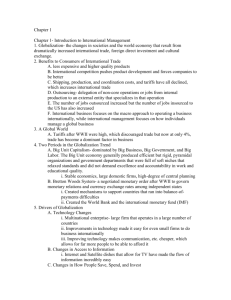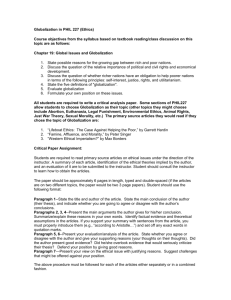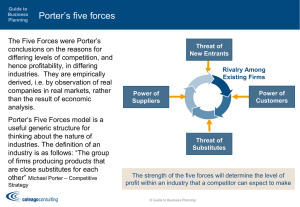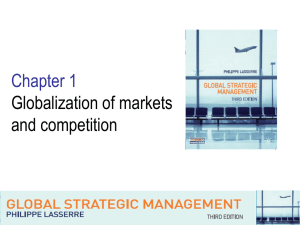INTERNATIONAL BUSINESS MIDTERM EXAM (Group C)
advertisement
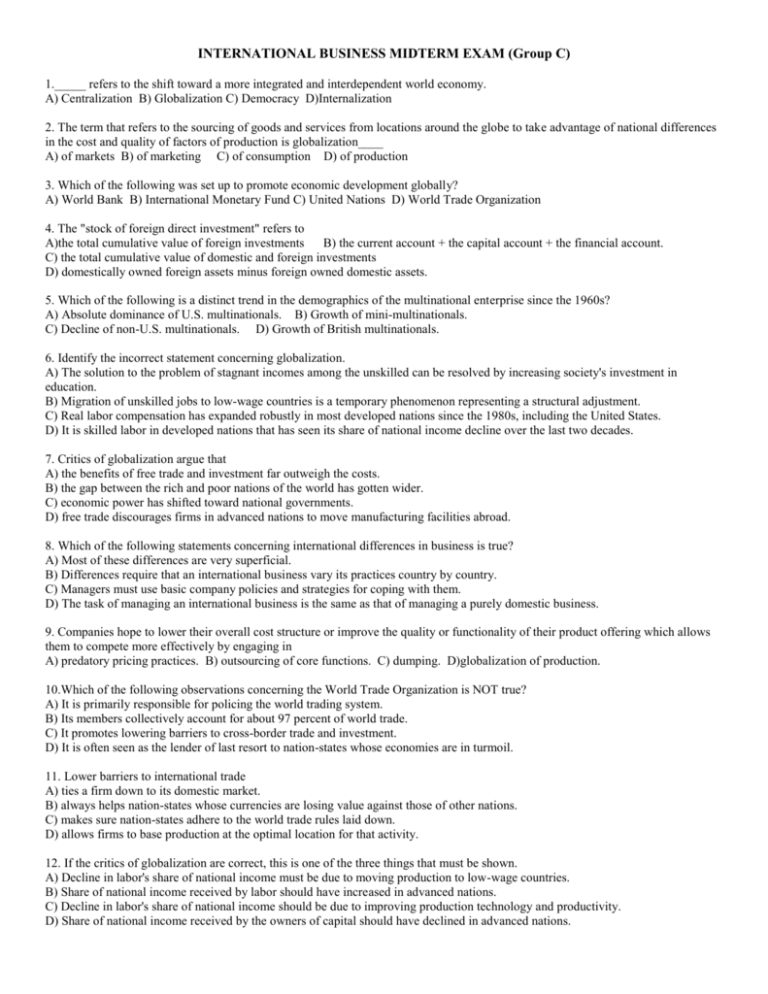
INTERNATIONAL BUSINESS MIDTERM EXAM (Group C) 1._____ refers to the shift toward a more integrated and interdependent world economy. A) Centralization B) Globalization C) Democracy D)Internalization 2. The term that refers to the sourcing of goods and services from locations around the globe to take advantage of national differences in the cost and quality of factors of production is globalization____ A) of markets B) of marketing C) of consumption D) of production 3. Which of the following was set up to promote economic development globally? A) World Bank B) International Monetary Fund C) United Nations D) World Trade Organization 4. The "stock of foreign direct investment" refers to A)the total cumulative value of foreign investments B) the current account + the capital account + the financial account. C) the total cumulative value of domestic and foreign investments D) domestically owned foreign assets minus foreign owned domestic assets. 5. Which of the following is a distinct trend in the demographics of the multinational enterprise since the 1960s? A) Absolute dominance of U.S. multinationals. B) Growth of mini-multinationals. C) Decline of non-U.S. multinationals. D) Growth of British multinationals. 6. Identify the incorrect statement concerning globalization. A) The solution to the problem of stagnant incomes among the unskilled can be resolved by increasing society's investment in education. B) Migration of unskilled jobs to low-wage countries is a temporary phenomenon representing a structural adjustment. C) Real labor compensation has expanded robustly in most developed nations since the 1980s, including the United States. D) It is skilled labor in developed nations that has seen its share of national income decline over the last two decades. 7. Critics of globalization argue that A) the benefits of free trade and investment far outweigh the costs. B) the gap between the rich and poor nations of the world has gotten wider. C) economic power has shifted toward national governments. D) free trade discourages firms in advanced nations to move manufacturing facilities abroad. 8. Which of the following statements concerning international differences in business is true? A) Most of these differences are very superficial. B) Differences require that an international business vary its practices country by country. C) Managers must use basic company policies and strategies for coping with them. D) The task of managing an international business is the same as that of managing a purely domestic business. 9. Companies hope to lower their overall cost structure or improve the quality or functionality of their product offering which allows them to compete more effectively by engaging in A) predatory pricing practices. B) outsourcing of core functions. C) dumping. D)globalization of production. 10.Which of the following observations concerning the World Trade Organization is NOT true? A) It is primarily responsible for policing the world trading system. B) Its members collectively account for about 97 percent of world trade. C) It promotes lowering barriers to cross-border trade and investment. D) It is often seen as the lender of last resort to nation-states whose economies are in turmoil. 11. Lower barriers to international trade A) ties a firm down to its domestic market. B) always helps nation-states whose currencies are losing value against those of other nations. C) makes sure nation-states adhere to the world trade rules laid down. D) allows firms to base production at the optimal location for that activity. 12. If the critics of globalization are correct, this is one of the three things that must be shown. A) Decline in labor's share of national income must be due to moving production to low-wage countries. B) Share of national income received by labor should have increased in advanced nations. C) Decline in labor's share of national income should be due to improving production technology and productivity. D) Share of national income received by the owners of capital should have declined in advanced nations. INTERNATIONAL BUSINESS MIDTERM EXAM (Group C) 13. Communists believed that socialism can be achieved only A)through violent revolution and totalitarian dictatorship B)by turning their backs on dictatorship and violence. C) by democratic means. D) when people exercise their rights directly or through elected representatives. 14. Individualism lays emphasis on the importance of guaranteeing individual freedom and self expression A)by letting some collective body dictate what is in the society's best interest. B)by viewing the needs of society as a whole C)by restricting anything that runs counter to "the good of society." D)by letting people pursue their own economic self-interest. 15. This is a form of government in which one person or political party exercises absolute control over all spheres of human life and prohibits opposing political parties. A) Anarchism B) Democracy C) Liberalism D) Totalitarianism 16. Which of the following is a safeguard enshrined in constitutional law so that elected representatives can be held accountable for their actions? A)A political state bureaucracy. B)Individual's right to freedom of expression, opinion, and organization. C)Unlimited terms for elected representatives. D)A court system that is completely dependent on the political system. 17. Which of the following is a typical characteristic of a command economy? A)Production determined by supply and demand. B)Firms have little incentive to control costs and become efficient. C)Output restrictions by the state to allow price increases. D)Free and fair competition encouraged between private producers. 18. The Human Development Index (HDI) is based on all of the following EXCEPT A) the life expectancy at birth of an individual. B) the educational attainment of people. C) whether average incomes are sufficient to meet the basic needs of life in a country. D) labor force participation rates. 19. Political systems can be assessed according to two dimensions. Which of the following is one among them? A)The degree to which they are socialist or capitalist. B)The degree to which they are democratic or totalitarian. C)The degree to which they are based on religious principles. D)The power orientation of the society. 20.To guarantee that elected representatives can be held accountable for their actions by the electorate, an ideal representative democracy has a number of safeguards. Which of the following is NOT one among them? A) A free media. B)Regular elections in which all eligible citizens are allowed to vote. C)Unlimited terms for elected representatives. D)Universal adult suffrage 21. Which form of totalitarianism is exemplified by states such as Iran and Saudi Arabia? A)Communist B)Right-wing C)Theocratic D)Tribal 22._____ is based on precedent, tradition, and custom. A)Common law B)Civil law C)Theocratic law D)Employment law 23. To account for differences in the cost of living, one can adjust GNI per capita by A)interest rate differential. B)purchasing power. C)debt levels. D)inflation. 24. The global changes in political and economic systems have several implications for international business. Which of the following is a positive effect of these global changes? A)The long-standing ideological conflict between collectivism and individualism that defined the twentieth century has diminished B)There is no guarantee that democracy will thrive in many of the world's newer democratic states. C)Totalitarian dictatorships could return, although they are unlikely to be of the communist variety. D)The economic promise inherent in the global shift toward market-based economic systems may stall in the face of conflicts between civilizations. 25. Which term refers to the extent to which individuals can move out of the strata into which they are born? A)Social mobility B)Social orientation C)Social stratification D)Social adaptability 26. _____ is the belief in the superiority of one's own culture. A)Ethnocentrism B)Cultural relativism C)Confucianism D)Egocentrism 27.According to Max Weber, the Protestant work ethic A)was needed to facilitate the development of socialism. B)discouraged the accumulation of capital. C)paved the way for the development of capitalism in Western Europe. D)pales in comparison with the Catholic work ethic. INTERNATIONAL BUSINESS MIDTERM EXAM (Group C) 28. What occurs when individuals overuse a resource held in common by all, but owned by no one, resulting in its degradation? A)Noblesse oblige B)Ethical dilemma C)Social stratification D)Tragedy of the commons 29. These are situations in which none of the available alternatives seems ethically acceptable. A)Ethical dilemmas B) Business ethics C)Ethical strategy D)Personal ethics 30. What either denies the value of business ethics or applies the concept in a very unsatisfactory way? A)Utilitarian approaches B)Justice theories C)Straw men D)Rights theories 31. _____ asserts that if a manager of a multinational sees that firms from other nations are not following ethical norms in a host nation, that manager should not either. A)A righteous moralist B)Cultural relativism C)The Friedman doctrine D)A naive immoralist 32. Which of the following does NOT hold true of the utilitarian approach to business ethics? A)The best decisions are those that produce the greatest good for the greatest number of people. B)One problem this approach faces is measuring the benefits, costs, and risks of a course of action. C)A problem with this approach is that the philosophy omits the consideration of justice. D)It recognizes that human beings have fundamental rights and privileges that transcend national boundaries and cultures. 33. For some time it was ethically justified for foreign companies to operate in South Africa as long as the "Sullivan principles" were followed. Which among the following is one of those two principles? A)It should use active resistance. B)It should constantly antagonize the South African government. C)It should do everything within its power to promote the abolition of apartheid laws. D)It should focus only on generating profits. 34. The Friedman doctrine states that A)a firm should adopt the ethics of the culture in which it is operating. B)the only social responsibility of business is to increase profits, so long as the company stays within the rules of law. C)the multinational's home-country standards of ethics are the appropriate ones for companies to follow in foreign countries. D)if a manager of a multinational sees that firms from other nations are not following ethical norms in a host nation, that manager should not either. 35. Which of the following statements agree with Kantian ethics? A)People should be treated as ends and never purely as means to the ends of others. B)Moral worth of actions or practices is determined by their consequences. C)Commit to the maximization of good and the minimization of harm. D)Actions have multiple consequences, some of which are good in a social sense and some of which are harmful. 36.According to philosopher John Rawls, once equal basic liberty is assured, inequality in basic social goods A)is to be allowed under all circumstances. B)is to be allowed only if such inequalities benefit everyone. C)is to be allowed if they benefit the position of the most-advantaged person. D)is never to be allowed. 37._____ refers to a situation where a government does not attempt to influence through quotas or duties what its citizens can buy from another country, or what they can produce and sell to another country. A)Trade bloc B)Balance of trade C)Free trade D)Single window system 38. When a gain of one country results in a loss by another it is called A)a win-win situation. B)a zero-sum game. C)the tragedy of commons. D) a lose-lose situation. 39. When a country is more efficient than any other country in producing a particular product it is said to have A)an absolute advantage. B)mobile resources. C)a comparative advantage. D)Diminishing returns. 40. The theory of comparative advantage suggests that trade is a A)zero-sum game. B)positive-sum game. C)the tragedy of commons. D)a lose-lose situation. 41. Which theory predicts that countries will export those goods that make intensive use of factors that are locally abundant, while importing goods that make intensive use of factors that are locally scarce? A)Heckscher-Ohlin theory B)Product life-cycle theory C)Diminishing returns theory D)New trade theory INTERNATIONAL BUSINESS MIDTERM EXAM (Group C) 42. Identify the most contentious implication of the new trade theory. A)The argument that a country better endowed with the factors of production will predominate. B)The argument it generates for government intervention and strategic trade policy. C)The argument that first mover advantage does not exist. D)The argument that nations will not benefit from trade if they do not differ in technology. 43. Michael Porter theorizes that four broad attributes of a nation shape the environment in which local firms compete. Which of the following is NOT one among them? A)Factor endowments B)First-mover advantages C)Relating and supporting industries D)Firm strategy, structure, and rivalry 44. According to Michael Porter, which of the following is an example of an advanced factor? A)Natural resources B)Climate C)Demographics D)Skilled labor 45. Which of the following theories stresses that some countries specialize in the production and export of particular products not because of underlying differences in factor endowments, but because in certain industries the world market can support only a limited number of firms? A)New trade B)Trade bloc C)Free trade D)Balance of trade 46. Identify the main flaw with mercantilism. A)Stating that it is in a country's best interests to maintain a trade surplus. B)Advocating government intervention to achieve a surplus in the balance of trade. C)Limiting imports by tariffs and quotas, while exports were subsidized. D)Viewing trade as one in which a gain by one country results in a loss by another. 47. Country A can produce 10 tons of cotton and 25 tons of sugarcane. Country B can produce 8 tons of cotton and 26 tons of sugarcane. Country C can produce 11 tons of cotton and 23 tons of sugarcane, while country D can produce 6 tons of cotton and 25 tons of sugarcane. All these countries use the same amount of resources. Which country is said to have an absolute advantage in the production of both the products in this simple assumption? A)Country C B)Country D C)Country A D)Country B 48. What are economies of scale? A)The extent to which a country is endowed with resources. B)The economic and strategic advantages that accrue to early entrants into an industry. C)The extent to which a country has to import goods. D)The cost reductions associated with a large scale output. 49. According to Michael Porter, this is an example of a "basic" factor of production. A)Demographics B)Skilled labor C)Research facilities D)Communication infrastructure 50. Identify one of the most pervasive findings of Porter's study. A)The relationship between advanced and basic factors is simple and straightforward. B)Successful industries within a country tend to be grouped into clusters of related industries. C)The role home demand plays in upgrading competitive advantage has been exaggerated. D)Chance and government are variables that rarely influence the national diamond. BONUS (5 POINTS each) 1)Explain Hinduism in less than 10 lines. (I will only read the first 10 lines) 2) Current News: What is today’s news regarding the Google-China problem. Explain in 5 lines. (I will only read the first 5 lines)
